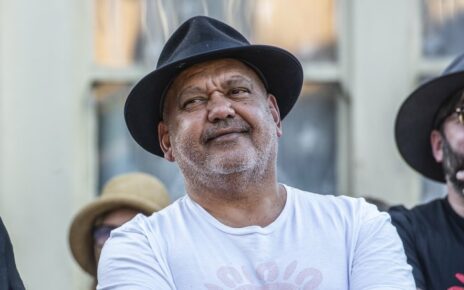I thought I was rebuilding my relationship with my father after he invited us to stay with him and his wife.
We’d been estranged for a number of years, during which time I’d got married and had a three-year-old son.
As well as wanting to reconnect with my father, I also wanted my family to get to know him – especially my son Jake*. His grandson.
I was hopeful.
Except, shortly after arriving, my son wanted to watch cartoons – my father declined as he wanted to watch the news. I asked him again, given that the cartoons were my son’s favourites. This was a mistake.
My father stormed out.
Shortly afterwards, he returned and said he wanted us to leave. ‘Here we go again,’ I thought.
That was the catalyst to trying to protect my children from his unpredictable behaviour and moods.
My relationship with my dad has always been a difficult one. In fact, the patterns of estrangement in my family go back to his mother, my grandmother.
She picked favourites amongst us, while some members of the family had the misfortune of being permanently out of favour with her – for reasons that weren’t entirely clear.
I was one of them.
My father evidently picked up on his mother’s disdain for me, and, as a result, my relationship with him growing up was cold and distant. I can’t say that I felt overly troubled – it was just the way things were.
My mother was a calming, behaviour-regulating influence on my father. We had a good relationship when I was a child. Although she wouldn’t step in to defend me, she did behave more rationally than him.
But during my time at university, their marriage ended. I moved back home after finishing my studies to find my mother had been replaced in the house by my father’s new wife, Susan*, a forceful, domineering woman.
The inevitable blow-up came just two weeks after I moved back home.
My father and Susan had been renting out my room to students while I was away, and one day I received a call from the placement agency asking if there was availability. I replied that I thought not, given that I’d moved back, but that they should call again and speak to my father.
When I mentioned the call to them, Susan hit the roof. ‘Who are you to decide what happens in my house?’ she demanded.
I replied that I’d decided nothing, but to no avail.
My father told me that my stay with them was over and I had to leave. As I’d only just finished university and didn’t have a job, he told me that he’d pay for me to stay in a hotel for one week.
After that, I was on my own.
As I packed the same suitcases I’d only just unpacked, I was neither upset nor surprised. It wasn’t as if I’d ever felt valued by him.
My mother had moved in with her sister, so staying there wasn’t an option. Fortunately, I accepted a job offer days later and was able to afford to rent a studio.
For the next six years, I had no contact with my father. It suited me just fine.
I tried to reconcile with him, but he wasn’t interested. He was still my father, after all – and I believed that a major factor in our split had been Susan.
By the time he did contact me, I was married with a three-year-old.
My father suggested that he’d visit us – without Susan, and I was very relieved. Hopeful.
He was friendly and jovial, without drama. Dad can be very personable when he wants to be, and both my wife and son liked him.
We both kept the conversation light, avoiding any contentious subjects. Because it went well, we agreed that we’d visit him and Susan for a weekend.
I was apprehensive about being around Susan but, given how excited my father seemed at having us stay, I thought it’d go well.
Yet, once again, I was kicked out of his house. This time, with my family in tow.
The weekend visit was over as quickly as it’d started – the sense of déjà vu palpable. Just like before, I didn’t feel overly upset. Nor did I feel embarrassed. It was more a case of shrugging it off with: ‘Well… that’s my father,’ and moving on.
He called us ‘pathetic’ and told us to never contact him again
In the back of my mind, though, the notion that I would possibly need to take steps in the future to protect my child had been seeded.
Sporadic phone and in-person contact continued for the next few years. Whenever he got in touch after periods of estrangement, the gaps were either glossed over as, ‘We seem to have lost touch’, or not addressed at all. He never apologised.
By the time my son was 12, my wife and I had had two daughters, then two and four. My father and Susan phoned us on Christmas Day, speaking to each of the children.
Soon, I received an email from them.
Your son said almost nothing on the phone and your youngest daughter is now two – she should be more than capable of having a conversation with us, but would not.
They told me this was unacceptable, that the children clearly didn’t care about or value them and that they didn’t want to hear from us again.
My father’s offensive manner towards me personally is like water off a duck’s back. However, this was an attack on my children and, as ridiculous and absurd as their complaint was, it’d gone too far. I felt disappointed that my father could cut off his grandchildren just like that. He didn’t deserve them.
Naturally, we didn’t tell the children what’d happened – part of our job was to protect them from this lunacy. Indeed, when the children asked us over the years why they’d heard nothing from Grandad and Susan, we simply said: ‘Sometimes they’re in touch with us, sometimes they aren’t,’ and left it.
Then, after five years, completely out of the blue, I received an email from my father that said that they’d like to be in contact with the children again.
Warily, I replied that they could be in indirect contact with them – no phone calls, only letters and emails. I decided to allow it because I believe that family relationships are to be preserved where possible.
More from Platform
Platform is the home of Metro.co.uk’s first-person and opinion pieces, devoted to giving a platform to underheard and underrepresented voices in the media.
Find some of our best reads of the week below:
An anonymous writer shares the moment that he realised he was groomed as a 14-year-old by a man in his 30s.
Metro.co.uk’s Josie Copson paid tribute to Wilko, a trip to which accompanied all of her life milestones.
Lowri Llewelyn was attacked while travelling solo through Scotland. She credits a stranger she met at her hostel the day before with saving her life.
And Heidi Crowter describes her perfect first date to her now-husband, James. The couple, who both have Down’s syndrome, instantly realised the other was their soulmate.
And since I don’t own the relationships that my children have with others, they’re not mine to take away.
I wanted my children to have positive interactions with my father. But, at the same time, I also needed to filter out the damaging behaviour.
Very sporadic contact was established – they’d send the children occasional emails, and sometimes presents at Christmas and on birthdays.
A couple of years passed, and the inevitable blow-up occurred.
My father had contacted Jake by email and Jake, then being a 20-year-old university student with assignments, an active social life and a girlfriend, didn’t reply immediately.
My father hit the roof, telling me that he was cutting off all contact with him. Jake wasn’t hurt by it, and just thought it was extremely bizarre behaviour. I told my father, once and for all, that his behaviour towards my children was unacceptable.
My response angered my father greatly, and he then cut contact with the rest of us, though we had nothing to do with it.
He called us ‘pathetic’ and told us to never contact him again.
It’s been just over a year since then, and we’ve just received yet another email from them asking to reestablish contact with the girls – but not me, my wife or Jake.
My answer to him was, as usual, that they can have indirect contact only. I don’t want to deprive my children of a relationship with their grandfather but I also don’t want them hurt by him.
As for my own relationship with my father, I see no evidence that he’s willing to change his ways or that he even recognises his behaviour as abnormal.
I personally don’t have any intention of going through yet another reconciliation with him when it’s almost certain that he’d repeat the pattern.
I’m just not interested.
I can’t change my father, but I can at least protect my children from him.
*Names have been changed
Degrees of Separation
This series aims to offer a nuanced look at familial estrangement.
Estrangement is not a one-size-fits-all situation, and we want to give voice to those who’ve been through it themselves.
If you’ve experienced estrangement personally and want to share your story, you can email [email protected] and/or [email protected]
Source: Read Full Article



